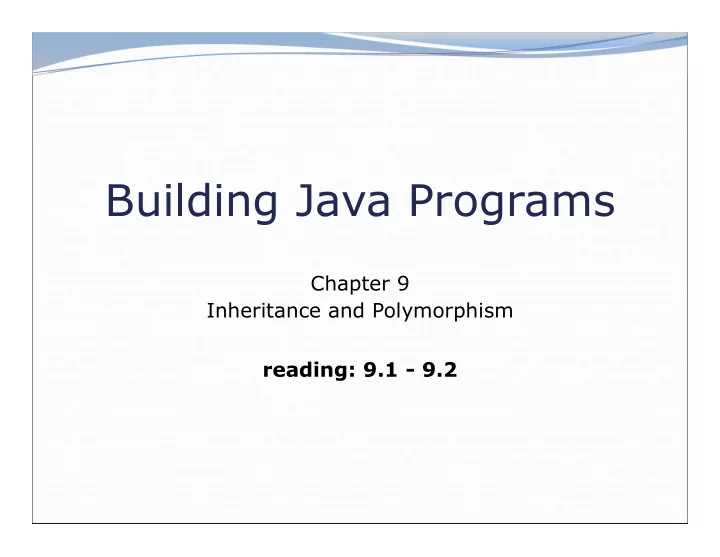

Building Java Programs Chapter 9 Inheritance and Polymorphism reading: 9.1 - 9.2
2
Recall: Inheritance inheritance : Forming new classes based on existing ones. a way to share/ reuse code between two or more classes superclass : Parent class being extended. subclass : Child class that inherits behavior from superclass. gets a copy of every field and method from superclass is-a relationship : Each object of the subclass also "is a(n)" object of the superclass and can be treated as one. Employee Yellow Form Lawyer Engineer Sales Rep. Yellow Form Yellow Form Purple Form Software Eng. Green Form 3
public class A { public void m1() { B b = new B(); m2(); S.o.pln(“A1”); b.m1(); } What is the output? A2 / A1 public void m2() { B2 / A1 S.o.pln(“A2”); } Some kind of error } I’m not sure public class B extends A { public void m2() { S.o.pln(“B2”); } } 4
Why cover this again? New Topics More practice with understanding polymorphism Investigating Java’s type system What happens when you using casting with objects? What is and isn’t possible for the compiler to check? Motivation: We’ve been hand-waving what it means to say List<Integer> list = new ArrayList<Integer>(); list.add(1); Why allow different types on the left side vs. right side? PromiseType variable = new ActualType (); PromiseType can be a super-type that ActualType extends or an interface that ActualType implements Restricts usage of the instance of ActualType to only PromiseType methods. Why is this useful? 5
Example: Music Players 6
MusicPlayer p3 = new Zune(); ((iPhone) p3).record(); What does this line do? Call record on Zune Call record on MusicPlayer Call record on iPhone Compiler Error Runtime Error 7
public class MusicPlayer { public class IPod public void m1() { extends MusicPlayer { S.o.pln(“MusicPlayer1”); public void m2() { } S.o.pln(“IPod2”); } m1(); public class TapeDeck } extends MusicPlayer { } public void m3() { public class IPhone S.o.pln(“TapeDeck3”); extends IPod { } public void m1() { } S.o.pln(“IPhone1”); m1 m2 m3 super.m1(); } MusicPlayer public void m3() { S.o.pln(“IPhone3”); TapeDeck } } IPod IPhone 8
MusicPlayer var1 = new TapeDeck(); MusicPlayer var2 = new IPod(); m1 m2 m3 MusicPlayer var3 = new IPhone(); IPod var4 = new IPhone(); ∕ ∕ Object var5 = new IPod(); MP1 MusicPlayer Object var6 = new MusicPlayer(); ∕ var1.m1(); MP1 TD3 TapeDeck MusicPlayer1 ∕ var3.m1(); IPod2 MP1 IPod IPhone1 / MusicPlayer1 m1 () var4.m2(); IPhone1 IPod2 IPhone3 IPod2 / IPhone1 / MusicPlayer1 IPhone MP1 m1 () var3.m2(); Compiler Error (CE) var5.m1(); Compiler Error (CE) 9
MusicPlayer var1 = new TapeDeck(); MusicPlayer var2 = new IPod(); m1 m2 m3 MusicPlayer var3 = new IPhone(); IPod var4 = new IPhone(); ∕ ∕ Object var5 = new IPod(); MP1 MusicPlayer Object var6 = new MusicPlayer(); ∕ ((TapeDeck) var1).m2(); MP1 TD3 TapeDeck Compiler Error (CE) ∕ ((IPod) var3).m2(); IPod2 MP1 IPod IPod2 / IPhone1 / MusicPlayer1 m1 () ((IPhone) var2).m1(); IPhone1 IPod2 IPhone3 Runtime Error (RE) IPhone MP1 m1 () ((TapeDeck) var3).m2(); Compiler Error (CE) 10
General Rule PromiseType var = new ActualType (); or var. method () (( CastType ) var). method (); Compile Time if (involves casting) { check if CastType has method , if not fail with CE } else { check if PromiseType has method , if not fail with CE } RunTime (if compiles) if (involves casting) { check if ActualType can actually be cast to CastType , if not fail with RE } call method on ActualType 11
Recommend
More recommend